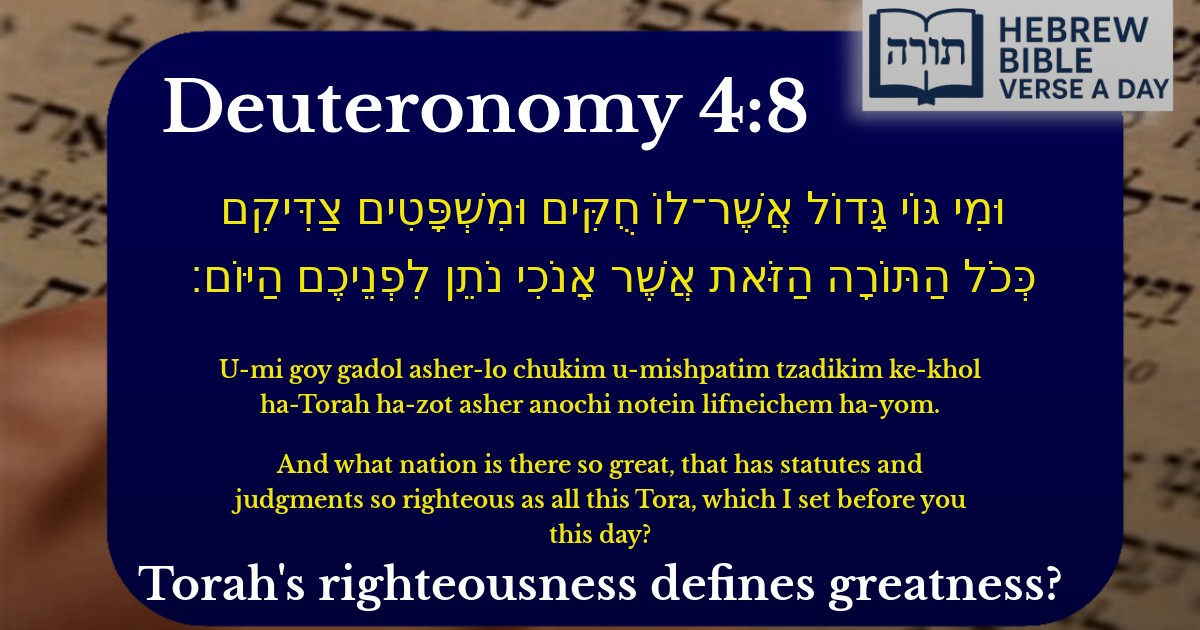Join Our Newsletter To Be Informed When New Videos Are Posted
Join the thousands of fellow Studends who rely on our videos to learn how to read the bible in Hebrew for free!
Hebrew Text
וּמִי גּוֹי גָּדוֹל אֲשֶׁר־לוֹ חֻקִּים וּמִשְׁפָּטִים צַדִּיקִם כְּכֹל הַתּוֹרָה הַזֹּאת אֲשֶׁר אָנֹכִי נֹתֵן לִפְנֵיכֶם הַיּוֹם׃
English Translation
And what nation is there so great, that has statutes and judgments so righteous as all this Tora, which I set before you this day?
Transliteration
U-mi goy gadol asher-lo chukim u-mishpatim tzadikim ke-khol ha-Torah ha-zot asher anochi notein lifneichem ha-yom.
Hebrew Leining Text
וּמִי֙ גּ֣וֹי גָּד֔וֹל אֲשֶׁר־ל֛וֹ חֻקִּ֥ים וּמִשְׁפָּטִ֖ים צַדִּיקִ֑ם כְּכֹל֙ הַתּוֹרָ֣ה הַזֹּ֔את אֲשֶׁ֧ר אָנֹכִ֛י נֹתֵ֥ן לִפְנֵיכֶ֖ם הַיּֽוֹם׃
Parasha Commentary
📚 Talmud Citations
This verse is quoted in the Talmud.
📖 Avodah Zarah 3a
The verse is cited in a discussion about the uniqueness of the Jewish people and their adherence to divine laws, contrasting them with other nations.
📖 Sotah 49b
The verse is referenced in a discussion about the righteousness of the Torah's statutes and judgments, emphasizing their divine origin and superiority.


The Greatness of Israel and the Torah
The verse (Devarim 4:8) highlights the unique relationship between the Jewish people and the Torah, emphasizing that no other nation possesses such righteous statutes and judgments. Rashi explains that the term "גּוֹי גָּדוֹל" ("great nation") refers not merely to political or military greatness, but to spiritual distinction—being close to Hashem through the Torah's mitzvot. The Ramban adds that the righteousness of the Torah's laws distinguishes Israel, as they embody divine wisdom and justice.
The Superiority of Torah Law
The phrase "חֻקִּים וּמִשְׁפָּטִים צַדִּיקִם" ("statutes and judgments so righteous") underscores two categories of mitzvot:
The Torah as a Divine Gift
The phrase "אֲשֶׁר אָנֹכִי נֹתֵן לִפְנֵיכֶם הַיּוֹם" ("which I set before you this day") is interpreted by the Sifrei to mean that the Torah must be approached as if it were given anew each day. The Vilna Gaon teaches that this mindset prevents complacency and ensures continuous spiritual growth in Torah study and observance.
Comparative Greatness of Nations
The Talmud (Avodah Zarah 2b) expounds that other nations may have wise or just laws, but none compare to the Torah's divine origin and comprehensive righteousness. The Midrash (Devarim Rabbah 2:14) states that even the most sophisticated gentile legal systems lack the eternal, transcendent quality of Torah law, which refines both individual character and societal morality.